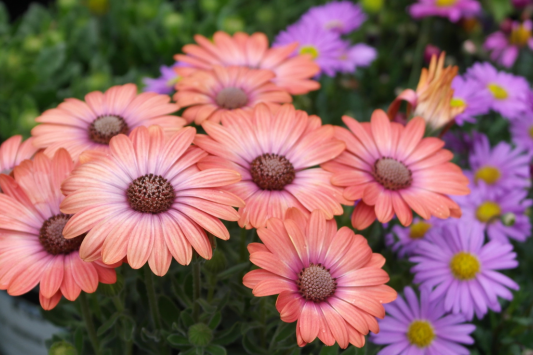Care for the African Daisy: Guide to Cultivating this Hardy Plant

Welcome to the charming world of the African daisy!
This plant is perfect for gardening lovers who want to add a dose of color and beauty to their spaces. With its vibrant flowers and resilience, the African daisy is a fantastic choice for both outdoor and indoor settings.
In this post, you'll discover all the care tips you need to keep your African daisy healthy. From the right amount of light to the secrets of watering, the ideal soil, fertilizing, and how to deal with those pesky pests, you'll become an expert in caring for this wonderful plant.
Let’s get started!
Caring for the African Daisy

Give it its dose of light
The African daisy loves sunlight, so make sure it gets its daily dose of light. Place it in a sunny spot in your garden or next to a window inside your home.
During spring and summer, it needs at least 6 hours of direct sunlight a day to shine in all its glory! If you live in a place with very hot summers, give it some shade during the hottest hours of the day to prevent it from burning.
In fall and winter, don’t worry, your African daisy adapts to partial shade. Although it loves the sun, it can tolerate lower light conditions during those cooler months.
Always remember that each plant is unique and may have its preferences, so observe how it responds and adjust to its needs!
Better with high temperatures
The African daisy enjoys warm temperatures, between 15°C and 25°C. In that range, you’ll see it grow and bloom with vitality.
However, don’t worry, your African daisy can withstand lower temperatures in the winter, down to about 5°C!
If you live in an area with cold winters, protect it from extreme cold. You can move it to a sheltered spot, like a greenhouse or covered area, when temperatures drop below 5°C. For potted plants, move them to a more protected area or cover them with cloths or blankets to keep them warm. Your African daisy will thank you!
Indoors or outdoors? (It adapts)
The African daisy is primarily an outdoor plant because it loves the sun. But don’t worry if you want to keep it indoors, it will adapt!
Look for a spot near a south- or west-facing window so it gets enough light. With 4-6 hours of indirect sunlight a day, your African daisy will feel right at home.
Remember that if you grow it indoors, it may not bloom as much as it would outdoors. But that won’t take away any of its charm. Also, make sure to provide a space with good air circulation to keep it happy and healthy.
Balance is key with watering
The African daisy has moderate watering needs. It likes to keep its soil slightly moist, but not waterlogged. During the active growing season (spring and summer), water it regularly, avoiding letting the soil dry out completely between waterings. A good technique is to wait until the top layer of soil is slightly dry before watering again.
In winter months, when it enters its resting period, reduce the watering frequency. The goal is to keep the soil slightly moist without soaking it. Be careful not to overwater, as this could harm the roots of your African daisy.
Drainage is essential
Your African daisy will thrive in well-drained soil. Mix potting soil with coarse sand or perlite to improve aeration and drainage. You can add a bit of organic matter, like compost or peat, to retain moisture without compromising drainage.
When repotting your African daisy, choose a pot slightly larger than the previous one to allow room for its roots to grow. Make sure the pot has drainage holes so excess water can escape from the soil. This will ensure a happy home for your plant!
Give it some food
Your African daisy loves to be fed during the active growing season. Every month, apply a balanced fertilizer, like a liquid one for flowering plants. Follow the manufacturer’s instructions for the right amount.
Don’t overdo the fertilizer, as this could cause excessive leaf growth at the expense of flowering. During the winter, when it’s resting, there’s no need to fertilize it, as its growth naturally slows down.
When to prune?
Your African daisy doesn’t need regular pruning, but you can give it a personal touch after the flowering season. Remove faded flowers and trim long, unruly branches to encourage compact growth and abundant future blooms.
If you want a more drastic change, at the end of winter or beginning of spring, perform a more intense pruning to rejuvenate the plant. Cut the older branches near the base to stimulate the growth of new branches. Your African daisy will look fresh and radiant!
Keep pests at bay
The African daisy is generally resistant to pests and diseases, but it may occasionally suffer from infestations of mites and aphids. If you notice yellowing, deformed, or spotted leaves, take quick action to control the pests.
Watch the humidity
Although the African daisy adapts well to various climatic conditions, it prefers environments with moderate humidity.
If you live in a very dry area or have heating in your home during the winter, you can increase humidity by placing a bowl of water near the plant or grouping several plants together. Avoid spraying the leaves directly, as this can encourage the growth of fungi.
Rotate the plant indoors
If you decide to keep your African daisy indoors, it’s recommended to rotate it every week so that all parts of the plant receive light evenly.
This will prevent uneven growth or one part becoming weaker due to lack of light.
Special care after repotting
If you decide to repot your African daisy, give it special care in the weeks following. It’s normal for the plant to experience slight "shock" after the change of pots. Make sure to provide ideal conditions: moderate watering, good light, and a draft-free environment.
Stimulating flowering
If you want to prolong your African daisy’s blooming, a good trick is to regularly remove faded flowers. This will allow the plant to focus its energy on producing new flowers instead of maintaining deteriorated parts.
Ready to care for your African daisy?
We hope this article helps you take better care of your daisy.
Remember, if you have any questions, don’t hesitate to contact us.
We’ll be happy to help you keep your plants healthy and happy.

 English
English Spanish
Spanish